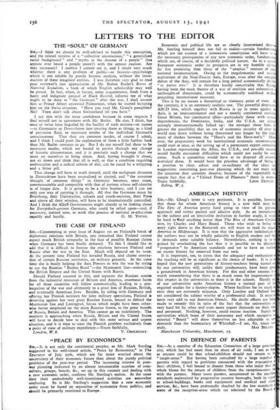LETTERS TO THE EDITOR
THE "SOUL" OF. GERMANY
Sta,—I think we should be well-advised to handle this conception, and the related notions of a " collective unconscious," " a generalised racial background " and " myths as the dreams of a people " (has anyone ever heard a people snore?) with the utmost caution. Are they necessary? I confess I cannot see it, and I doubt very much whether there is any problem of public—or historic—psychology which is not soluble by purely historic analysis, without the intro- duction of these imagined entities. I was therefore very glad to read your reviewer's just appreciation of Mr. Rohan Butler's Roots of National Socialism, a hook of which English scholarship may well be proud. In fact, when, in future, some acquaintance, fresh from a hasty and indignant perusal of Black Record, informs me of what ought to be done to " the Germans " after the war, I shall answer him as Prince Albert answered Palmerston, when he started lecturing him on the Swiss situation. " Have you read Mr. Grote's pamphlet? No? Then don't talk about Switzerland till you have."
I say this with the more confidence because in some respects I find myself not in agreement with Mr. Butler. He also, I think, has once or twice been beguiled by the facility of such notions—or names —as Germanity or Deutschtum into treating them as things, as a kind of pervasive fluid, or necessary modes of the individual German's consciousness. That they are common modes, of course I admit, and I think I could push the explanation of them a little further back than Mr. Butler ventures to go. But I do not myself feel them to be necessary modes, which are bound to persist through any change of historic circumstance, and it is precisely such a change that we must set ourselves to bring about. And, having brought it about, not sit down and think that all is well, or that a condition requiring embrocation and a radical reform of diet, can be cured by a whipping and a bitter pill.
That change will have to work inward, until the malignant elements in Deutschtum have been neutralised or ejected, and " the common thought of common things " in Germany becomes, once more, commensurable and compatible with that of nations whose self-identity is of longer date. It is going to be a slow business, and I can see only one way of carrying it through. All that the Germans mean by Erziehung, their Universities, schools and youth-societies, their Press and above all their wireless, will have to be internationally controlled. And I think the Allied Governments ought already to be looking about for Europiiisch-gesumt Germans, who could be relied upon—and, if necessary, trained now, to work this process of national re-education


























 Previous page
Previous page